Posts Tagged: eggs
Bird flu in the Midwest causing egg prices to rise

"And they're not, for the most part, affected by the disease, but they can be carriers of it," Pitesky said. "It means we're euthanizing those flocks that are affected."
The story said 40 million laying hens, one-eighth of the country's laying population, had to be euthanized, dramatically reducing the egg supply. Turkeys are still more susceptible to the condition.
“Turkey prices are going up also, and we're still not sure how that will affect turkey prices around Thanksgiving," Pitesky said.
California chickens haven't been hit by bird flu, but they are producing fewer eggs because new laws went into effect this year requiring more room for hens to move around, reducing some farms' capacity.
December farm stories
Davis Wednesday afternoon farmers' market can be quiet in December, so what better time to learn a little about what's going on back at the farms? Every farmer I talked with today had delicious treats to sell and a story to tell. Here are a few:
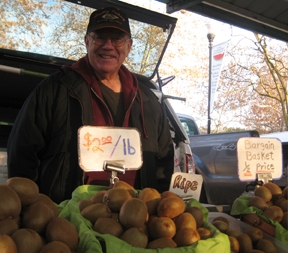
The fuzzy green fruit for sale today from Stenzel's Kiwi Farm was harvested late in October and has been held in cold storage at 32 degrees since then. The fruit will last about six months stored this way, allowing Stenzel to bring out what he needs, grade it by size, let it ripen a little, but sell it while it's still firm. When you bring your kiwis home, let them ripen three or four days more for the best flavor.
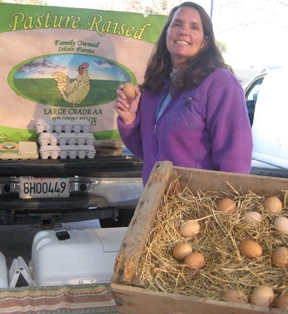
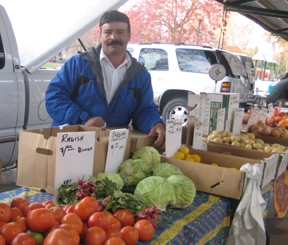
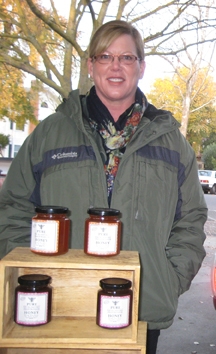
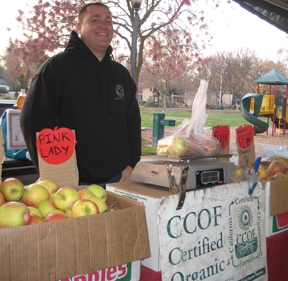
Give it a try - visit your local winter farmers market and learn some new stories!
To find farmers' markets in your community, visit the UC small farm program's California Agriculture Tourism Directory.
Dan Sumner a part of NY Times animal cruelty debate
New laws were proposed this spring in Iowa, Minnesota and Florida that would make it a crime to take undercover videos or photos at industrial farms, a tactic often used to show mistreatment of animals and unsanitary conditions, the New York Times reported.
In response to this development, the Times invited nine experts to debate issues related to farm animal welfare. The director of the UC Agricultural Issues Center, Dan Sumner, took part in the discussion, noting that in addition to legal and moral questions, there are economic issues worth considering.
In his essay, titled Economics in the Hen House, Sumner outlined Proposition 2, a law voters approved in 2008 that ends the use of conventional cages in California egg production by 2015. Sumner said the new law will ban eggs that 95 percent of buyers now choose - less expensive, conventionally produced eggs - and allow only more expensive "free range chicken" eggs, which are already available, but rejected by the vast majority of shoppers.
He believes the use of graphic images in the campaign detracted from an informed policy debate about the potential impacts of Proposition 2. Emotional appeals with ugly images can sway a public debate, he said, while noting that farmers also use their own favored images to garner support for farm policy.
"A picture may be worth a thousand words, but sometimes a few numbers and some evidence may be worth even more," Sumner concluded.

Hen house living conditions are part of the animal welfare debate.
The party's ova
Spring is a big time of year for celebrating with a very cheap (cheep?), common, protein-rich food: the chicken egg. And because the hard-boiled egg has a special place at the Seder table and an important role in Easter morning hunts and afternoon picnics, eggs right now are selling like hotcakes. Problem is, the more eggs your market sells, the more likely you are to get them extra fresh, and consequently, the more trouble you're likely to have getting the things to peel when it's time to eat them up.
Chemistry is at the root of the egg-peeling problem: a newly laid egg has a slightly lower, more acidic pH value than the raw egg that you've stored in the refrigerator for a few days. The higher pH of the stored egg allows its white to cling less firmly to the membrane just inside the shell once it is cooked, and less cling means you can get the shell off more cleanly and easily. If you managed to plan ahead and get your eggs five or more days ahead of time this year, good for you! If you didn't, well, better luck next time. Clean-peeling or not, they'll still taste great.
There's a whole lot more to know about eggs than you might imagine—like whether you should wash eggs before you put them in the fridge (you shouldn't), what's the best way to store eggs in the fridge if you want them to last (pointy end down), and whether the refrigerator door egg rack was really such a great invention after all (it wasn't)—and a fun way to learn more is to visit a 4-H Avian Bowl competition at your local County Fair or other 4-H event.
Thanks to the guidance and commitment of UC Extension Poultry Specialist Francine Bradley, California 4-H teams have been doing very well lately in the Avian Bowl, winning first place in the national competition in eight out of the last ten years.
So next time you have a question about eggs or chickens, go find a 4-Her. Just don't ask them which came first. They get that a lot.

brown eggs in the straw
Any chicken can shed salmonella
Last month's enormous egg recall continues to generate news coverage about efforts to keep salmonella-contaminated eggs out of the U.S. food supply.
Experts quoted in a Los Angeles Times story published yesterday agreed that salmonella contamination can happen in any egg production system - large operations, small family farms or in the backyard. Chickens infected with salmonella shed the pathogen in their feces, which can contaminate the egg shell. In rare instances, salmonella infects a hen's ovaries and can end up inside the eggs she lays, the article said.
A Texas A&M University professor said eggs from large-scale producers should, theoretically, be safer because they are subject to state and federal regulations requiring inspections and regular testing for pathogens, including salmonella.
A Louisiana State University professor said the cages on commercial farms have slanted bottoms so eggs roll out right after they're laid, making it less likely they will come in contact with hen droppings.
Michele Jay-Russell, food safety specialist at the Western Institute for Food Safety and Security at UC Davis, told reporter Elena Conis when a foodborne illness breaks out in a large commercial concern, the problem becomes a huge, national problem very quickly. But that doesn't mean smaller-scale production is safer.
The article cited two studies comparing the occurrence of salmonella in free-range and conventionally produced eggs:
- A 1996 study published in the journal Avian Disease found higher levels of a specific type of salmonella in free-range compared to caged birds.
- A 2004 study conducted by researchers at the Poultry Microbiological Safety Research Unit at the Richard B. Russell Agricultural Research Center in Athens, Ga., found no difference in salmonella levels in free-range chickens compared to conventionally raised chickens.

Backyard producers should also take precautions to avoid foodborne illness.